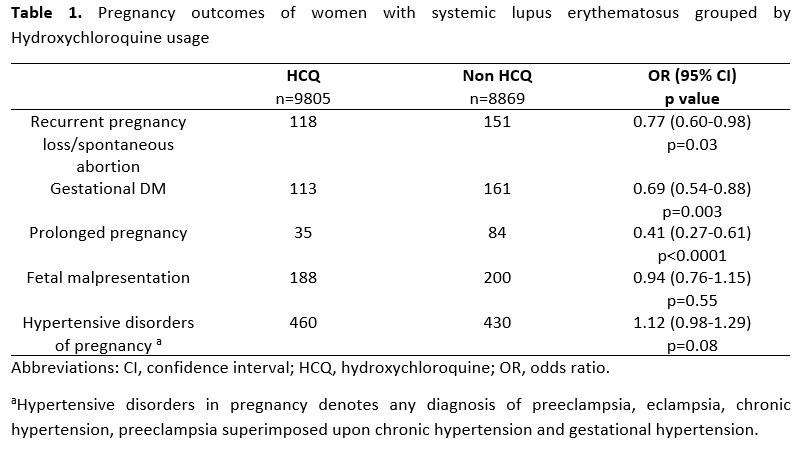Session Information
Session Type: Poster Session B
Session Time: 9:00AM-11:00AM
Background/Purpose: Systemic lupus erythematosus (SLE) is a multisystem autoimmune disease, that affects women of childbearing age. SLE is a high-risk condition in pregnant patients due to increased maternal and fetal mortality and morbidity. Hydroxychloroquine (HCQ) has demonstrated beneficial effects on pregnancy outcomes in patients with SLE based on immunomodulatory, metabolic, and vasculoprotective properties. This study aims to describe the effects of HCQ use on maternal outcomes in pregnant SLE patients.
Methods: This is a nationwide, cross-sectional study. We used the global, multicenter research network (TriNetX) database from 82 large healthcare organizations across multiple countries. We included pregnant women from age 18 to 55 with diagnosis of SLE between January 1st, 2010, and December 31st, 2022 using International Classification of Disease-10 codes. We compared pregnant SLE patients on HCQ with pregnant-SLE patients not on HCQ, using a 1:1 propensity score matching that accounted for demographics variables (age, race, ethnicity), comorbidities [hypertension, overweight/obesity, diabetes mellitus (DM), dyslipidemias], laboratory results, including levels of C-reactive protein (CRP), erythrocyte sedimentation rate (ESR), cholesterol, triglycerides, hemoglobin A1C (HbA1c) and use of steroids (prednisone or prednisolone) at baseline. The outcomes of interest include recurrent pregnancy loss/spontaneous abortion, hypertensive disorders of pregnancy, gestational DM, prolonged pregnancy, and fetal malpresentation events. The exposure time window for outcomes was any time during the pregnancy duration. Odds ratios with 95% confidence intervals were calculated for each outcome. A two-sided p-value less than 0.05 was considered statistically significant.
Results: We identified 9,805 pregnant SLE patients on HCQ and 8,869 pregnant SLE patients not on HCQ. At baseline, patients who were not taking HCQ, had higher levels of CRP (14.1±31.4 vs 11.4±28.7 mg/L, p=0.002), cholesterol (174±41.3 mg/dL vs 171±44.8 mg/dL, p=0.02), triglycerides (125±113 mg/dL vs 118±85.6 mg/dL, p=0.02) and HbA1c (5.71±1.54% vs 5.57±1.19%, p=0.001). When compared both groups, the odds of developing recurrent pregnancy loss/spontaneous abortion (OR=0.77, CI95% 0.60-0.98, p=0.03), gestational DM (OR=0.69, CI95% 0.54-0.88, p=0.003) and prolonged pregnancy (OR=0.41, CI95% 0.27-0.61, p< 0.0001), were significantly lower among patients taking HCQ, whereas the odds of developing fetal malpresentation (OR=0.94, CI95% 0.76-1.15, p=0.55) and hypertensive disorders of pregnancy (OR=1.12, CI95% 0.98-1.29, p=0.08) was not statistically different when compared both groups.
Conclusion: Pregnant patients with SLE taking HCQ appear to have lower odds of recurrent pregnancy loss/spontaneous abortion, gestational DM, and prolonged pregnancy compared with ones not taking HCQ. Larger studies, preferably randomized and blinded, will be required to confirm these findings.
To cite this abstract in AMA style:
Gonzalez Y, Tan I. Effects of Hydroxychloroquine on Maternal Outcomes in Pregnant Patients with Systemic Lupus Erythematous [abstract]. Arthritis Rheumatol. 2023; 75 (suppl 9). https://acrabstracts.org/abstract/effects-of-hydroxychloroquine-on-maternal-outcomes-in-pregnant-patients-with-systemic-lupus-erythematous/. Accessed .« Back to ACR Convergence 2023
ACR Meeting Abstracts - https://acrabstracts.org/abstract/effects-of-hydroxychloroquine-on-maternal-outcomes-in-pregnant-patients-with-systemic-lupus-erythematous/

